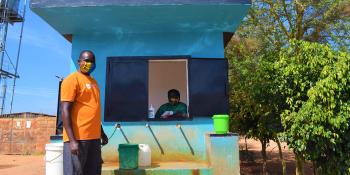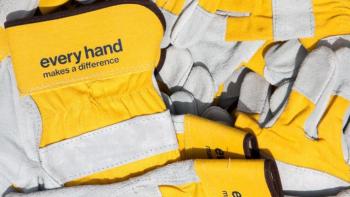
Community maintains sanitary water kiosks during COVID-19
Morrix knows all too well just how difficult life was before the water kiosks arrived.
The 40-year-old, his wife Lucy and their four children do not have running water in their house in the Bauleni neighborhood of the Zambian capital of Lusaka. Few families in the city’s densely populated, low-income settlements like Bauleni do — most can’t afford to connect their homes to the local water system, which is run by a private company.
Before Habitat for Humanity Zambia installed a water kiosk in his neighborhood in 2019, Morrix would wake up before daybreak to collect water from a nearby farm. Sometimes his 14-year-old son Rabson would miss school in order to help.
“This farm was half an hour away on foot,” he recalls. “This early morning journey was not safe. In addition, we had to wait in long lines for our turn to draw water.”
But the installation of the water kiosk around the corner from his house — a giant cement cubicle with an attendant on the inside and multiple water taps on the outside — produced a ripple effect of positive impacts.
“I spend less time on fetching water, which means that I have time to attend community meetings and spend more time with my family,” Morrix says. His family also lives healthier, with improved hygiene and sanitation. And now that Rabson does not need to miss classes, his grades have improved.
As COVID-19 grew into a pandemic, however, community residents immediately identified public water kiosks as a risk area for transmission of the disease. Large numbers of residents visit every day, collecting the water they need for drinking, cooking, cleaning and bathing.
Habitat Zambia, which has installed 28 water kiosks in and around Lusaka like the one near Morrix’s house, put out a call for help. Morrix eagerly stepped forward, taking a part-time position to help monitor his neighborhood’s water kiosk.
He ensures that people who come to use the kiosk wear protective masks and wash their hands thoroughly before drawing water. He cleans the kiosk regularly and assures that lids stay on the water containers. He does all of this to help protect his neighbors — and the water source that has made their community a healthier, better place to live.

